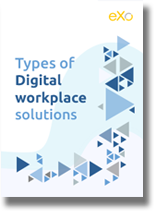- Fares Laroui
- December 26, 2018
How retail companies can enhance employee engagement
Every digital workplace initiative is driven by business needs that are specific to the industry.
In previous blog posts and on our website, we covered the different challenges faced by certain industries, and how the effective adoption of a digital workplace can play a vital role in responding to specific needs.
A digital workplace can help businesses to revolutionize the way they operate.

Content
1. Challenges
The retail industry is one of the industries most affected by digital transformation. From Amazon’s cutting-edge stores to Walmart’s innovative delivery services, retail businesses are on what seems to be an endless quest to get their hands on the latest technologies to differentiate themselves and to deliver better value to their customers.
For retail businesses, technological advances and workforce engagement go hand in hand, as store employees are the face of the business and their ability to embrace the latest technologies can significantly improve the products and services, customer satisfaction, and brand image.
In today’s competitive retail landscape, a failure to deliver any of these can have damaging effects on the business’s overall performance.
Here are the most common recurring workplace challenges faced by retail businesses today:
Disconnected workforce
With the emergence of new retail trends like “click and collect” keeping employees connected along the delivery chain is becoming increasingly crucial for efficient day-to-day operations.
Connecting store personnel with their back-office peers is also important for enhancing the sense of belonging and for conveying company culture and brand image across the whole organization.
Based on several studies and our experience with eXo clients, the connection, if there is any, is often top-down with no room for interactions, which directly leads to a low level of engagement and a high turnover rate.
Misinformed workforce
Retail businesses are known for their reliance on seasonal workers, especially in peak periods across their different stores.
More often than not, onboarding these new employees and teaching them the technical and soft skills they need can be challenging.
The absence of a rich knowledge base for newcomers directly leads to an increase in the time spent looking for information from different sources.
Business tools overload
Retail employees, whether in the back office or on the sales floor, often use a number of different business tools specific to their role within the organization.
The absence of a collaboration hub that can combine these tools through integrations and add-ons can lead to the dispersion of information and make it hard for employees to collaborate on their daily tasks.
2. How a digital workplace can help retail businesses
Break down silos
The effective implementation of a digital workplace that is accessible via desktop and mobile devices can help to significantly improve internal communications and collaborations between back-office employees and their customer-facing peers.
Employees from different departments can keep up-to-date with the latest company news and collaborate on daily tasks within dedicated spaces for each department (for example, marketing, sales, etc.) or project (product launch, point of sale advertising, etc.).
Enterprise social features, like an activity stream or a built-in chat application, facilitate interactions and the sharing of ideas, which can lead to a more engaged workforce, a healthy work environment, and satisfied customers.
Provide a robust knowledge management system
Onboarding and training new staff members are always a tough ask if the organization does not have the right tools.
Keeping information stored in a single location (yet widely accessible) is the key to tackling this issue.
A robust knowledge management system integrated with the digital workplace helps employees create, share, and find information with ease.
It directly leads to an increase in efficiency as employees (especially new starts) will spend less time looking for information.
Moreover, it will encourage teamwork and the exchange of experiences, and it will promote the company’s culture by conveying the company’s policies and guidelines.
A holistic digital workplace
Information is the most valuable asset for retailers today. Accessible and shareable data play an important role in shaping retail strategies and offerings.
Providing the entire retail workforce—from managers to data analysts and store employees—with a holistic digital workplace solution can bear significant results.
First, it can reduce the reliance on email and other traditional communication channels. Thus, retail managers can be certain that internal communication is happening in dedicated spaces and that no information has been lost in long email threads or other messaging platforms.
Second, a solution that can integrate all the business tools and applications used for daily operations will improve collaboration and access to data. Real-time dashboards can, for example, include historical payment data, consumer data etc.
In retail, store employees are the heart of the business, as they directly represent the business offerings to consumers and they convey the brand image.
So, it is critical to give them the tools they need to connect and collaborate effectively. Implementing a digital workplace will help to connect staff members from different departments and stores and will help to convey the brand image and company culture effectively.
This will result in an engaged workforce, a healthy work environment, and happy and satisfied customers.

FREE WHITE PAPER
Types of Digital workplace solutions
The modern workplace has evolved significantly in recent years, with advancements in technology, the growing number of tools …
Related posts
- All
- eXo
- Digital workplace
- Employee engagement
- Open source
- Future of work
- Internal communication
- Collaboration
- News
- intranet
- workplace
- Knowledge management
- Employee experience
- Employee productivity
- onboarding
- Employee recognition
- Change management
- Cartoon
- Digital transformation
- Infographic
- Remote work
- Industry trends
- Product News
- Thought leadership
- Tips & Tricks
- Tutorial
- Uncategorized
Leave a Reply
( Your e-mail address will not be published)


